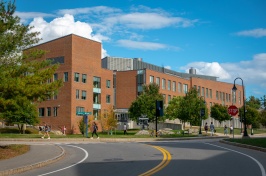Researchers Discuss Climate Change, Microbes, and Great Bay Oysters at UNH April 29
DURHAM, N.H. - Oyster farming is growing in New Hampshire's Great Bay, but so is a disease that threatens our enjoyment of the tasty shellfish. Four University of New Hampshire faculty share their collaborative research on the rising incidence of the pathogen Vibrio, which contaminates oyster beds and can cause foodborne illness, and the role climate change plays in its increase. Their lecture, "Climate Change and the Rising Microbial Tide," on Tuesday, April 29, 2014, is the final faculty research excellence seminar at the University of New Hampshire for this academic year.
- Climate Change and the Rising Microbial Tide
- Tuesday, April 29, 2014, 4:00 - 6:30 p.m. (Presentations and discussion: 4:00-5:30 p.m.; networking reception: 5:30 - 6:30 p.m.)
- Squamscott Room, Holloway Commons, UNH in Durham
- R.S.V.P.: https://www.events.unh.edu/RegistrationForm.pm?event_id=16474
- Presenters: Cheryl Whistler, associate professor of molecular, cellular, and biomedical sciences; Stephen Jones, research associate professor of natural resources and the environment and associate director of the New Hampshire Sea Grant College Program; Vaughn Cooper, associate professor of molecular, cellular, and biomedical sciences; Tom Safford, associate professor of sociology and a faculty fellow in the Carsey Institute at UNH
Vibrio are normal residents of estuaries but a small fraction can cause gastrointestinal disease and in rare cases, severe wound infections. While the ecology of these organisms is poorly understood, their abundance correlates with warmer temperatures and heavy rainfall, conditions which are becoming more frequent. UNH researchers Cheryl Whistler, Stephen Jones, Vaughn Cooper, and Thomas Safford are working together on this problem, studying genetic, ecological, evolutionary, and social aspects in order to improve the scientific basis for decisions to manage our growing regional oyster beds.
The Faculty Research Excellence Seminar Series presents research by UNH faculty and selected researchers from outside UNH to foster interdisciplinary discussion and encourage new collaborations.
The University of New Hampshire, founded in 1866, is a world-class public research university with the feel of a New England liberal arts college. A land, sea, and space-grant university, UNH is the state's flagship public institution, enrolling 12,300 undergraduate and 2,200 graduate students.
-30-
Latest News
-
October 8, 2025
-
October 2, 2025
-
September 24, 2025
-
September 15, 2025
-
August 21, 2025














































